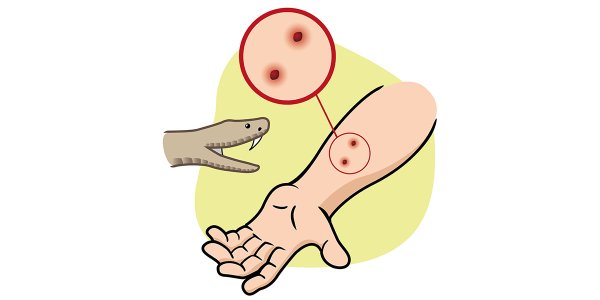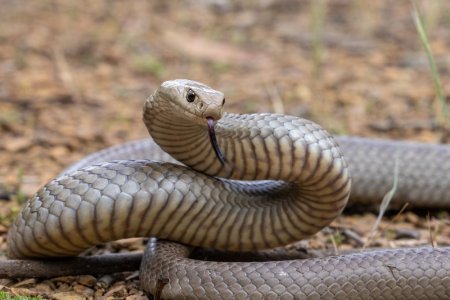Dangerous ordeal: A 69-year-old man loses his life to a snake bite after trying to help friend
If your friend was in danger, you would try to help them out in whatever way you could–and that's exactly what one brave man in Queensland did recently.
Unfortunately, this brave act of heroism also came with a hefty price: his life.
Two men were attending a celebration for Koumala State School's 100-year anniversary when tragedy struck.
One of the men, in his 60s, had a snake coiled around one of his legs. His mate, aged 69, tried to help the affected man by removing the snake and was himself bitten in the process.
When Queensland Ambulance Service's (QAS) Acting Deputy Commissioner of Operations South, Claire Bertenshaw, was asked at a press conference on Sunday how the second man was possibly bitten, she speculated that it must have been on the arm.
'There was a rapid call for an ambulance, and bystanders performed CPR immediately as the man collapsed,' she said.
Paramedics quickly arrived on the scene, performed CPR, and used a defibrillator. Unfortunately, the man still passed away from cardiac arrest.
‘Despite heroic measures by both the bystanders and the Queensland Ambulance Service, he was unable to be revived and passed away,’ Ms Bertenshaw expressed.
The second man was taken to the Mackay Base Hospital and is now in stable condition.
‘The other fellow is well–he was taken to the hospital last night. I can’t say with any certainty whether he was bitten or not,’ Bertenshaw claimed.
The authorities suspected the man was bitten by a brown snake. ‘From the symptoms that the patient had and the cardiac collapse, it would be more than likely a brown snake, but again, that’s just a guess,’ Bertenshaw stated.
According to Australian Geographic, eastern brown snakes–along with other browns–are fast-moving and aggressive. They are responsible for more deaths in Australia every year than any other group of snakes.
Their venom is ranked second most toxic of any land snake in the world. It causes paralysis and stops blood from clotting. Victims may collapse after a few minutes.
Bertenshaw gave us all a big reminder about what to do in case something like this happened.
'We want to try and limit the amount that [any venom] moves around your body and what is circulated around,' Bertenshaw explained.
'You need to lie down, stay still as possible, call for help as quickly as possible. Have someone else apply a pressure immobilisation bandage to the affected limb–and that should be about as tight as you would do for a sprain–and just wait for help to arrive. Try and stay as calm as possible.'
You can watch 9 News Australia’s coverage of the story here:
Snake bite first aid techniques
While snakes are a vital part of our ecosystem, understanding how to react to a snake bite is essential for survival. Acting swiftly and correctly can mean the difference between life and death. We've compiled a series of steps to guide you on what to do and what not to do when faced with this dangerous ordeal.
Firstly, when you have been bitten, it is crucial not to panic. Stay calm, reduce movement and try to maintain a low heart rate. Remember, the more active you are, the quicker the venom spreads through your body. If possible, try to take note of the snake's appearance. This can help medical practitioners identify the species and administer the correct antivenom.
Next, your instinct may be to suck the venom out of the bite, but that's a big no-no! Contrary to popular belief, this does not remove the venom and could potentially increase the chances of infection. As Ms Bertenshaw advised, apply a compression bandage over the wound as soon as possible. The bandage should be applied on the bite site and wrapped firmly—about the tightness of a sprain—moving upward to the whole limb.
If you are alone and bitten on the arm, you can use your other hand to apply the bandage. If bitten elsewhere and unable to apply the bandage alone, or if you notice signs of shock such as pale, cold skin, rapid breathing, or a weak pulse, call emergency immediately and stay as still as possible until help arrives.
Furthermore, never attempt to catch or kill the snake involved. This is not only dangerous but also unnecessary. Protect yourself first.
Lastly, it's crucial to seek medical attention immediately, even if you don't see any symptoms. Some toxins can have delayed reactions, but early intervention can improve the outcome significantly.
Remember, the best way to handle a snake bite is to avoid one altogether. Stay cautious and respectful of our slithery neighbours, but in case of an unfortunate encounter, be ready with the proper first aid response.

To better prepare ourselves for a situation like this, members, we recommend researching venomous snakes in Australia and what to do if ever you were bitten. Don't take any risks, be sure to stay alert and stay vigilant.
What do you think of this story, members? Let us know in the comments below!
Unfortunately, this brave act of heroism also came with a hefty price: his life.
Two men were attending a celebration for Koumala State School's 100-year anniversary when tragedy struck.
One of the men, in his 60s, had a snake coiled around one of his legs. His mate, aged 69, tried to help the affected man by removing the snake and was himself bitten in the process.
When Queensland Ambulance Service's (QAS) Acting Deputy Commissioner of Operations South, Claire Bertenshaw, was asked at a press conference on Sunday how the second man was possibly bitten, she speculated that it must have been on the arm.
'There was a rapid call for an ambulance, and bystanders performed CPR immediately as the man collapsed,' she said.
Paramedics quickly arrived on the scene, performed CPR, and used a defibrillator. Unfortunately, the man still passed away from cardiac arrest.
‘Despite heroic measures by both the bystanders and the Queensland Ambulance Service, he was unable to be revived and passed away,’ Ms Bertenshaw expressed.
The second man was taken to the Mackay Base Hospital and is now in stable condition.
‘The other fellow is well–he was taken to the hospital last night. I can’t say with any certainty whether he was bitten or not,’ Bertenshaw claimed.
The authorities suspected the man was bitten by a brown snake. ‘From the symptoms that the patient had and the cardiac collapse, it would be more than likely a brown snake, but again, that’s just a guess,’ Bertenshaw stated.
According to Australian Geographic, eastern brown snakes–along with other browns–are fast-moving and aggressive. They are responsible for more deaths in Australia every year than any other group of snakes.
Their venom is ranked second most toxic of any land snake in the world. It causes paralysis and stops blood from clotting. Victims may collapse after a few minutes.
Bertenshaw gave us all a big reminder about what to do in case something like this happened.
'We want to try and limit the amount that [any venom] moves around your body and what is circulated around,' Bertenshaw explained.
'You need to lie down, stay still as possible, call for help as quickly as possible. Have someone else apply a pressure immobilisation bandage to the affected limb–and that should be about as tight as you would do for a sprain–and just wait for help to arrive. Try and stay as calm as possible.'
You can watch 9 News Australia’s coverage of the story here:
Snake bite first aid techniques
While snakes are a vital part of our ecosystem, understanding how to react to a snake bite is essential for survival. Acting swiftly and correctly can mean the difference between life and death. We've compiled a series of steps to guide you on what to do and what not to do when faced with this dangerous ordeal.
Firstly, when you have been bitten, it is crucial not to panic. Stay calm, reduce movement and try to maintain a low heart rate. Remember, the more active you are, the quicker the venom spreads through your body. If possible, try to take note of the snake's appearance. This can help medical practitioners identify the species and administer the correct antivenom.
Next, your instinct may be to suck the venom out of the bite, but that's a big no-no! Contrary to popular belief, this does not remove the venom and could potentially increase the chances of infection. As Ms Bertenshaw advised, apply a compression bandage over the wound as soon as possible. The bandage should be applied on the bite site and wrapped firmly—about the tightness of a sprain—moving upward to the whole limb.
If you are alone and bitten on the arm, you can use your other hand to apply the bandage. If bitten elsewhere and unable to apply the bandage alone, or if you notice signs of shock such as pale, cold skin, rapid breathing, or a weak pulse, call emergency immediately and stay as still as possible until help arrives.
Furthermore, never attempt to catch or kill the snake involved. This is not only dangerous but also unnecessary. Protect yourself first.
Lastly, it's crucial to seek medical attention immediately, even if you don't see any symptoms. Some toxins can have delayed reactions, but early intervention can improve the outcome significantly.
Remember, the best way to handle a snake bite is to avoid one altogether. Stay cautious and respectful of our slithery neighbours, but in case of an unfortunate encounter, be ready with the proper first aid response.
Key Takeaways
- A man in his 60s has died from a snake bite after helping to remove a snake coiled around his friend’s leg in Koumala, Queensland.
- The two men were at Koumala State School’s 100-year anniversary celebrations when the incident occurred.
- Despite immediate CPR efforts from bystanders and paramedics, the man could not be revived and passed away. The second man was transported to Mackay Base Hospital and is in stable condition.
- Claire Bertenshaw of the Queensland Ambulance Service said they believed it was likely a brown snake and highlighted first aid steps, including applying a pressure immobilisation bandage and staying as calm and still as possible.
To better prepare ourselves for a situation like this, members, we recommend researching venomous snakes in Australia and what to do if ever you were bitten. Don't take any risks, be sure to stay alert and stay vigilant.
What do you think of this story, members? Let us know in the comments below!









